formerly eScholarship Editions


|
|
|
|
Your search for
'Medicine' in subject
found 76 book(s). | Modify Search | Displaying 41 - 60 of 76 book(s) | |
| 41. |  | Title: Imperial bedlam: institutions of madness in colonial southwest Nigeria Author: Sadowsky, Jonathan Hal Published: University of California Press, 1999 Subjects: African Studies | Psychology | African History | Medicine | Social Problems Publisher's Description: The colonial government of southern Nigeria began to use asylums to confine the allegedly insane in 1906. These asylums were administered by the British but confined Africans. Yet, as even many in the government recognized, insanity is a condition that shows cultural variation. Who decided the inmates were insane and how? This sophisticated historical study pursues these questions as it examines fascinating source material - writings by African patients in these institutions and the reports of officials, doctors, and others - to discuss the meaning of madness in Nigeria, the development of colonial psychiatry, and the connections between them. Jonathan Sadowsky's well-argued, concise study provides important new insights into the designation of madness across cultural and political frontiers. Imperial Bedlam follows the development of insane asylums from their origins in the nineteenth century to innovative treatment programs developed by Nigerian physicians during the transition to independence. Special attention is given to the writings of those considered "lunatics," a perspective relatively neglected in previous studies of psychiatric institutions in Africa and most other parts of the world. Imperial Bedlam shows how contradictions inherent in colonialism were articulated in both asylum policy and psychiatric theory. It argues that the processes of confinement, the labeling of insanity, and the symptoms of those so labeled reflected not only cultural difference but also political divides embedded in the colonial situation. Imperial Bedlam thus emphasizes not only the cultural background to madness but also its political and experiential dimensions. [brief] Similar Items |
| 42. |  | Title: Hysteria beyond Freud Author: Gilman, Sander L Published: University of California Press, 1993 Subjects: History | Literature | Women's Studies | Psychiatry | Medicine Publisher's Description: "She's hysterical." For centuries, the term "hysteria" has been used by physicians and laymen alike to diagnose and dismiss the extreme emotionality and mysterious physical disorders presumed to bedevil others - especially women. How has this medical concept assumed its power? What cultural purposes does it serve? Why do different centuries and different circumstances produce different kinds of hysteria?These are among the questions pursued in this absorbing, erudite reevaluation of the history of hysteria. The widely respected authors draw upon the insights of the new social and cultural history, rather than Freudian psychoanalysis, to examine the ways in which hysteria has been conceived by doctors and patients, writers and artists, in Europe and North America, from antiquity to the early years of the twentieth century. In so doing, they show that a history of hysteria is a history of how we understand the mind. [brief] Similar Items |
| 43. | 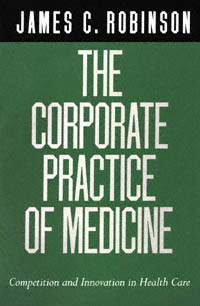 | Title: The corporate practice of medicine: competition and innovation in health care Author: Robinson, James C 1953- Published: University of California Press, 1999 Subjects: Politics | Public Policy | Medicine | Economics and Business Publisher's Description: One of the country's leading health economists presents a provocative analysis of the transformation of American medicine from a system of professional dominance to an industry under corporate control. James Robinson examines the economic and political forces that have eroded the traditional medical system of solo practice and fee-for-service insurance, hindered governmental regulation, and invited the market competition and organizational innovations that now are under way. The trend toward health care corporatization is irreversible, he says, and it parallels analogous trends toward privatization in the world economy.The physician is the key figure in health care, and how physicians are organized is central to the health care system, says Robinson. He focuses on four forms of physician organization to illustrate how external pressures have led to health care innovations: multispecialty medical groups, Independent Practice Associations (IPAs), physician practice management firms, and physician-hospital organizations. These physician organizations have evolved in the past two decades by adopting from the larger corporate sector similar forms of ownership, governance, finance, compensation, and marketing.In applying economic principles to the maelstrom of health care, Robinson highlights the similarities between competition and consolidation in medicine and in other sectors of the economy. He points to hidden costs in fee-for-service medicine - overtreatment, rampant inflation, uncritical professional dominance regarding treatment decisions - factors often overlooked when newer organizational models are criticized.Not everyone will share Robinson's appreciation for market competition and corporate organization in American health care, but he challenges those who would return to the inefficient and inequitable era of medicine from which we've just emerged. Forcefully written and thoroughly documented, The Corporate Practice of Medicine presents a thoughtful - and optimistic - view of a future health care system, one in which physician entrepreneurship is a dynamic component. [brief] Similar Items |
| 44. | 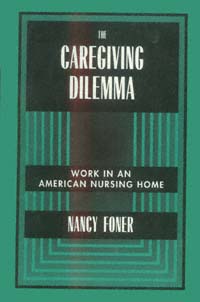 | Title: The caregiving dilemma: work in an American nursing home Author: Foner, Nancy 1945- Published: University of California Press, 1994 Subjects: Anthropology | Medical Anthropology | Social Problems | Medicine | Women's Studies Publisher's Description: Along with increasing life expectancy comes the knowledge that many Americans will one day enter nursing homes. Who are the people who will care for us or for our relatives? Nancy Foner provides a major study of institutional care that focuses on nursing aides, who are the backbone of American nursing homes. She examines the strains and paradoxes facing nursing aides - asked, on the one hand, to provide compassionate care and, on the other, to cope with the pressures of the workplace and the institution.Aides are expected to look after patients, who are predominantly older women, with kindness and consideration, but nursing home regulations and bureaucratic forces often hinder even the best efforts to offer consistently supportive care. Positioned at the bottom of the nursing hierarchy, aides must cope with the needs of frail, dependent residents, pressures from patients' relatives and from their own families, and demands of supervisors and coworkers.Foner's detailed description and analysis of caregiving dilemmas, based on intensive field research in a New York facility, brings the perspective of the nursing aides to the fore. This is a timely contribution to the study of work, bureaucracy, and the future of an aging American population. [brief] Similar Items |
| 45. | 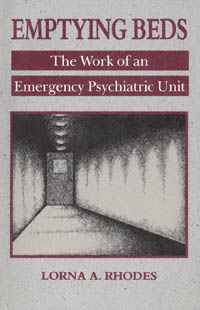 | Title: Emptying beds: the work of an emergency psychiatric unit Author: Rhodes, Lorna A. (Lorna Amarasingham) Published: University of California Press, 1991 Subjects: Anthropology | Medical Anthropology | Psychiatry | Social Problems | Medicine Publisher's Description: The work of inner-city emergency psychiatric units might best be described as "medicine under siege." Emptying Beds is the result of the author's two-year immersion in one such unit and its work. It is an account of the strategies developed by a staff of psychiatrists, social workers, nurses, and ot . . . [more] Similar Items |
| 46. | 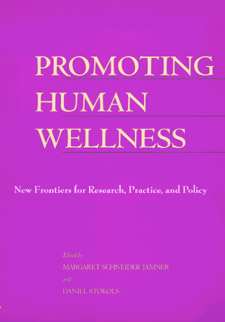 | Title: Promoting human wellness: new frontiers for research, practice, and policy Author: Jamner, Margaret Schneider Published: University of California Press, 2001 Subjects: Medicine | Public Policy | Anthropology | Aging | Education Publisher's Description: This book is a state-of-the-art educational resource on the latest research and public-policy developments in the fields of wellness promotion and disease prevention. Based on award-winning lectures by University of California faculty on nine campuses as part of the Wellness Lectures Program jointly funded by The California Wellness Foundation, Health Net, and the University of California, the volume aims to widen the scope of health care research and policy to promote wellness rather than focus on illness and disease, and to incorporate proactive, interdisciplinary approaches to health care. The volume also contains chapters by distinguished scholars inthe fields of wellness promotion and disease prevention. Many of these articles fall outside the scope of what we conventionally call health promotion, bringing new perspectives to research and policy possibilities. Promoting Human Wellness is organized around core themes such as the importance of disease prevention programs that address multiple health risks, the link between poverty and minority status and disease susceptibility, and the challenge of evaluating health benefits and cost-effectiveness. The articles discuss such timely issues as genetic determinism as a paradigm in wellness promotion, adolescent health promotion and teen pregnancy prevention strategies, racial differences in cancer epidemiology, the California smokers' helpline, strategies for reducing youth violence, HIV/AIDS prevention, domestic violence education and prevention srategies, and the future of women's health research. Presented within the framework of social ecology, several of the chapters in this volume address new ideas and approaches in the wellness field that are only now beginning to be understood such as the social construction of variables including race, class, and gender. Promoting Human Wellness will be essential reading for health practitioners, policymakers, and others seeking to expand the ways we define and achieve health. Keywords: Public health, community health, medicine, nursing, social welfare, health education, health psychology, social ecology, public policy, aging, health promotion. [brief] Similar Items |
| 47. | 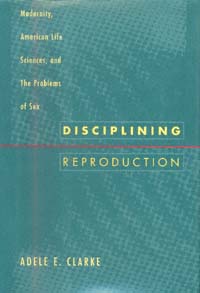 | Title: Disciplining reproduction: modernity, American life sciences, and "the problems of sex" Author: Clarke, Adele Published: University of California Press, 1998 Subjects: Sociology | Medical Anthropology | Medicine | American Studies | Gender Studies Publisher's Description: Reproductive issues from sex and contraception to abortion and cloning have been controversial for centuries, and scientists who attempted to turn the study of reproduction into a discipline faced an uphill struggle. Adele Clarke's engrossing story of the search for reproductive knowledge across the twentieth century is colorful and fraught with conflict.Modern scientific study of reproduction, human and animal, began in the United States in an overlapping triad of fields: biology, medicine, and agriculture. Clarke traces the complicated paths through which physiological approaches to reproduction led to endocrinological approaches, creating along the way new technoscientific products from contraceptives to hormone therapies to new modes of assisted conception - for both humans and animals. She focuses on the changing relations and often uneasy collaborations among scientists and the key social worlds most interested in their work - major philanthropists and a wide array of feminist and medical birth control and eugenics advocates - and recounts vividly how the reproductive sciences slowly acquired standing.By the 1960s, reproduction was disciplined, and the young and contested scientific enterprise proved remarkably successful at attracting private funding and support. But the controversies continue as women - the targeted consumers - create their own reproductive agendas around the world. Elucidating the deep cultural tensions that have permeated reproductive topics historically and in the present, Disciplining Reproduction gets to the heart of the twentieth century's drive to rationalize reproduction, human and nonhuman, in order to control life itself. [brief] Similar Items |
| 48. | 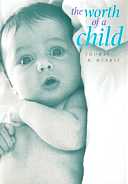 | Title: The worth of a child Author: Murray, Thomas H 1946- Published: University of California Press, 1996 Subjects: Philosophy | Ethics | Medicine | Social Problems | Public Policy Publisher's Description: Thomas Murray's graceful and humane book illuminates one of the most morally complex areas of everyday life: the relationship between parents and children. What do children mean to their parents, and how far do parental obligations go? What, from the beginning of life to its end, is the worth of a child?Ethicist Murray leaves the rarefied air of abstract moral philosophy in order to reflect on the moral perplexities of ordinary life and ordinary people. Observing that abstract moral terms such as altruism and selfishness can be buried in the everyday doings of families, he maintains that ethical theory needs a richer description than it now has of the moral life of parents and children. How far should adults go in their quest for children? What options are available to women who do not want to bear a child now? Should couples be allowed to reject a child because of genetic disability or "wrong" gender? How can we weigh the competing claims of the genetic and the rearing parents to a particular child? The Worth of a Child couples impressive learning with a conversational style. Only by getting down to cases, Murray insists, can we reach moral conclusions that are unsentimental, farsighted, and just. In an era of intense public and private acrimony about the place and meaning of "family values," his practical wisdom about extraordinary difficult moral issues offers compelling reading for both experienced and prospective parents, as well as for ethicists, social and behavioral scientists, and legal theorists. [brief] Similar Items |
| 49. | 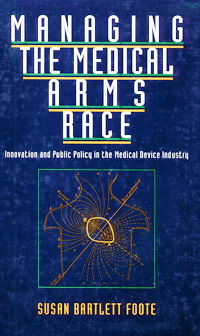 | Title: Managing the medical arms race: public policy and medical device innovation Author: Foote, Susan Bartlett Published: University of California Press, 1992 Subjects: Politics | Medicine | Public Policy | Economics and Business Publisher's Description: The allure of medical innovation is powerful - it holds out the promise of perfect health, the end of pain, the deferral of death. Our insatiable appetite for costly new technologies, fed by a profusion of innovations and the profits they generate, has led to what has been dubbed the medical arms race. During the last several decades government has been called upon to manage the escalation of this race.Foote has written the first comprehensive examination of the profound influence of government policies on medical innovation. She explains how these policies have proliferated to affect every stage of the innovative process in medical device technology - from the first research idea to the patient's bedside. Drawing on case studies of technologies as diverse as lasers, cardiac pacemakers, CT scanners, and IUDs, she traces the interaction between the industry and government institutions, including the National Institutes of Health, the FDA, and the Medicare and Medicaid programs.Public policies during the 1950s and 1960s, Foote discovers, tended to promote innovation, while the regulation and cost controls of the 1970s and 1980s began to inhibit it. For the 1990s and beyond she proposes incremental policy improvements that will rationalize and streamline government intervention. She cautions that we must recognize the limits of medical technology and public policy to cure all ills.Medical innovation is a crucial part of health care reform, a subject of increasing complexity and controversy. Written clearly and accessibly, Managing the Medical Arms Race is an invaluable source for medical, industry, and policy professionals, but it also has much to say to anybody concerned with how we as a society choose to take care of our health. [brief] Similar Items |
| 50. |  | Title: Drug war politics: the price of denial Author: Bertram, Eva Published: University of California Press, 1996 Subjects: Politics | Public Policy | Law | Sociology | Medicine | American Studies Publisher's Description: Why have our drug wars failed and how might we turn things around? Ask the authors of this hardhitting exposè of U.S. efforts to fight drug trafficking and abuse. In a bold analysis of a century's worth of policy failure, Drug War Politics turns on its head many familiar bromides about drug politics. It demonstrates how, instead of learning from our failures, we duplicate and reinforce them in the same flawed policies. The authors examine the "politics of denial" that has led to this catastrophic predicament and propose a basis for a realistic and desperately needed solution.Domestic and foreign drug wars have consistently fallen short because they are based on a flawed model of force and punishment, the authors show. The failure of these misguided solutions has led to harsher get-tough policies, debilitating cycles of more force and punishment, and a drug problem that continues to escalate. On the foreign policy front, billions of dollars have been wasted, corruption has mushroomed, and human rights undermined in Latin America and across the globe. Yet cheap drugs still flow abundantly across our borders. At home, more money than ever is spent on law enforcement, and an unprecedented number of people - disproportionately minorities - are incarcerated. But drug abuse and addiction persist.The authors outline the political struggles that help create and sustain the current punitive approach. They probe the workings of Washington politics, demonstrating how presidential and congressional "out-toughing" tactics create a logic of escalation while the criticisms and alternatives of reformers are sidelined or silenced. Critical of both the punitive model and the legalization approach, Drug War Politics calls for a bold new public health approach, one that frames the drug problem as a public health - not a criminal - concern. The authors argue that only by situating drug issues in the context of our fundamental institutions - the family, neighborhoods, and schools - can we hope to provide viable treatment, prevention, and law enforcement. In its comprehensive investigation of our long, futile battle with drugs and its original argument for fundamental change, this book is essential for every concerned citizen. [brief] Similar Items |
| 51. | 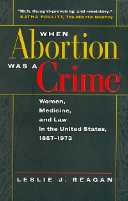 | Title: When abortion was a crime: women, medicine, and law in the United States, 1867-1973 Author: Reagan, Leslie J Published: University of California Press, 1997 Subjects: History | Women's Studies | United States History | Medicine Publisher's Description: As we approach the 30th anniversary of Roe v. Wade , it's crucial to look back to the time when abortion was illegal. Leslie Reagan traces the practice and policing of abortion, which although illegal was nonetheless widely available, but always with threats for both doctor and patient. In a time when many young women don't even know that there was a period when abortion was a crime, this work offers chilling and vital lessons of importance to everyone.The linking of the words "abortion" and "crime" emphasizes the difficult and painful history that is the focus of Leslie J. Reagan's important book. Her study is the first to examine the entire period during which abortion was illegal in the United States, beginning in the mid-nineteenth century and ending with Roe v. Wade in 1973. Although illegal, millions of abortions were provided during these years to women of every class, race, and marital status. The experiences and perspectives of these women, as well as their physicians and midwives, are movingly portrayed here.Reagan traces the practice and policing of abortion. While abortions have been typically portrayed as grim "back alley" operations, she finds that abortion providers often practiced openly and safely. Moreover, numerous physicians performed abortions, despite prohibitions by the state and the American Medical Association. Women often found cooperative practioners, but prosecution, public humiliation, loss of privacy, and inferior medical care were a constant threat.Reagan's analysis of previously untapped sources, including inquest records and trial transcripts, shows the fragility of patient rights and raises provocative questions about the relationship between medicine and law. With the right to abortion again under attack in the United States, this book offers vital lessons for every American concerned with health care, civil liberties, and personal and sexual freedom. [brief] Similar Items |
| 52. | 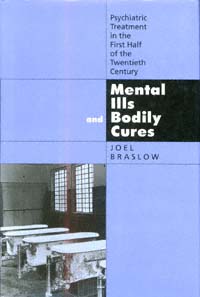 | Title: Mental ills and bodily cures: psychiatric treatment in the first half of the twentieth century Author: Braslow, Joel T 1959- Published: University of California Press, 1997 Subjects: Science | Psychiatry | Medicine | History and Philosophy of Science | Psychology Publisher's Description: Mental Ills and Bodily Cures depicts a time when psychiatric medicine went to lengths we now find extreme and perhaps even brutal ways to heal the mind by treating the body. From a treasure trove of California psychiatric hospital records, including many verbatim transcripts of patient interviews, Joel Braslow masterfully reconstructs the world of mental patients and their doctors in the first half of the twentieth century. Hydrotherapy, sterilization, electroshock, lobotomy, and clitoridectomy - these were among the drastic somatic treatments used in these hospitals.By allowing the would-be healers and those in psychological and physical distress to speak for themselves, Braslow captures the intense and emotional interplay surrounding these therapies. His investigation combines revealing clinical detail with the immediacy of "being there" in the institutional setting while decisions are made, procedures undertaken, and results observed by all those involved. We learn how well-intentioned physicians could rationalize and regard as therapeutic treatments that often had dreadful consequences, and how much the social and cultural world is inscribed within the practice of biological psychiatry. The book will interest historians of medicine, practicing psychiatrists, and everyone who knows or has seen what it's like to be in mental distress. [brief] Similar Items |
| 53. | 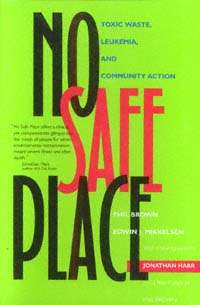 | Title: No safe place: toxic waste, leukemia, and community action Author: Brown, Phil Published: University of California Press, 1997 Subjects: Sociology | American Studies | Ecology | Medicine | Technology and Society Publisher's Description: Toxic waste, contaminated water, cancer clusters - these phrases suggest deception and irresponsibility. But more significantly, they are watchwords for a growing struggle between communities, corporations, and government. In No Safe Place , sociologists, public policy professionals, and activists will learn how residents of Woburn, Massachusetts discovered a childhood leukemia cluster and eventually sued two corporate giants. Their story gives rise to questions important to any concerned citizen: What kind of government regulatory action can control pollution? Just how effective can the recent upsurge of popular participation in science and technology be? Phil Brown, a medical sociologist, and Edwin Mikkelsen, psychiatric consultant to the plaintiffs, look at the Woburn experience in light of similar cases, such as Love Canal, in order to show that toxic waste contamination reveals fundamental flaws in the corporate, governmental, and scientific spheres.The authors strike a humane, constructive note amidst chilling odds, advocating extensive lay involvement based on the Woburn model of civic action. Finally, they propose a safe policy for toxic wastes and governmental/corporate responsibility. Woburn, the authors predict, will become a code word for environmental struggles. [brief] Similar Items |
| 54. | 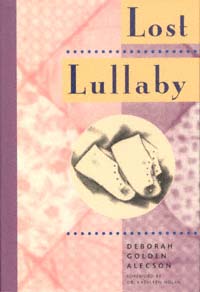 | Title: Lost lullaby Author: Alecson, Deborah Golden 1954- Published: University of California Press, 1995 Subjects: American Studies | Gender Studies | Women's Studies | Medicine | Ethics | Sociology Publisher's Description: Lost Lullaby makes one think the unthinkable: how a loving parent can pray for the death of her child. It is Deborah Alecson's story of her daughter, Andrea, who was born after a full-term, uneventful pregnancy, weighing 7 pounds 11 ounces, perfectly formed and exquisitely featured. But an inexplicable accident at birth left her with massive and irreversible brain damage. On a vitality scale of one to ten, her initial reading was one. And so begins Deborah Alecson's heart-rending struggle to come to terms with two desperately conflicting and powerful emotions: her desire to nurture and love Andrea, and her desire to do everything in her power to bring about her death.Told in a mother's voice, with a simplicity and directness that heighten the intensity of the drama that unfolds, Lost Lullaby reaffirms the human dimension of what is too often an abstract and purely theoretical discussion. During the two months that Andrea spent in the Infant Intensive Care Unit, Ms. Alecson spoke with lawyers, doctors, and ethicists in an effort to understand the legal, medical and ethical implications of her plight. She recounts those discussions and describes legal cases that have a direct bearing on her own situation. Her battle - both in coming to the agonizing decision to let her child die and in convincing the medical and legal establishments to respect that decision - will engender empathy for the plight of many families, and an awareness of the need to use medical technology with restraint. It is a must-read for everyone who cares about how we make life-and-death decisions on these new medical, legal, and moral frontiers. [brief] Similar Items |
| 55. |  | Title: Taming the wind of desire: psychology, medicine, and aesthetics in Malay shamanistic performance Author: Laderman, Carol Published: University of California Press, 1991 Subjects: Anthropology | Asian Studies | Medical Anthropology | Psychology | Southeast Asia | Medicine Publisher's Description: Charged with restoring harmony and relieving pain, the Malay shaman places his patients in trance and encourages them to express their talents, drives, personality traits - the "Inner Winds" of Malay medical lore - in a kind of performance. These healing ceremonies, formerly viewed by Western anthropologists as exotic curiosities, actually reveal complex multicultural origins and a unique indigenous medical tradition whose psychological content is remarkably relevant to contemporary Western concerns.Accepted as apprentice to a Malay shaman, Carol Laderman learned and recorded every aspect of the healing seance and found it comparable in many ways to the traditional dramas of Southeast Asia and of other cultures such as ancient Greece, Japan, and India. The Malay seance is a total performance, complete with audience, stage, props, plot, music, and dance. The players include the patient along with the shaman and his troupe. At the center of the drama are pivotal relationships - among people, between humans and spirits, and within the self. The best of the Malay shamans are superb poets, dramatists, and performers as well as effective healers of body and soul. [brief] Similar Items |
| 56. | 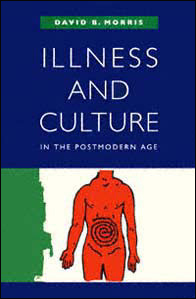 | Title: Illness and culture in the postmodern age Author: Morris, David B Published: University of California Press, 1998 Subjects: Sociology | Philosophy | Medicine | Technology and Society | Anthropology | American Studies Publisher's Description: We become ill in ways our parents and grandparents did not, with diseases unheard of and treatments undreamed of by them. Illness has changed in the postmodern era - roughly the period since World War II - as dramatically as technology, transportation, and the texture of everyday life. Exploring these changes, David B. Morris tells the fascinating story, or stories, of what goes into making the postmodern experience of illness different, perhaps unique. Even as he decries the overuse and misuse of the term "postmodern," Morris shows how brightly ideas of illness, health, and postmodernism illuminate one another in late-twentieth-century culture.Modern medicine traditionally separates disease - an objectively verified disorder - from illness - a patient's subjective experience. Postmodern medicine, Morris says, can make no such clean distinction; instead, it demands a biocultural model, situating illness at the crossroads of biology and culture. Maladies such as chronic fatigue syndrome and post-traumatic stress disorder signal our awareness that there are biocultural ways of being sick.The biocultural vision of illness not only blurs old boundaries but also offers a new and infinitely promising arena for investigating both biology and culture. In many ways Illness and Culture in the Postmodern Age leads us to understand our experience of the world differently. [brief] Similar Items |
| 57. |  | Title: Birth as an American rite of passage Author: Davis-Floyd, Robbie Published: University of California Press, 1992 Subjects: Anthropology | Medical Anthropology | Women's Studies | Cultural Anthropology | Medicine | Gender Studies Publisher's Description: Why do so many American women allow themselves to become enmeshed in the standardized routines of technocratic childbirth - routines that can be insensitive, unnecessary, and even unhealthy? And why, in spite of the natural childbirth movement, has hospital birth become even more intensely technologized? Robbie Davis-Floyd argues that these obstetrical procedures are rituals that reflect a cultural belief in the superiority of science over nature. Her interviews with 100 mothers and many health care professionals reveal in detail both the trauma and the satisfaction women derive from childbirth. She also calls for greater cultural and medical tolerance of the alternative beliefs of women who choose to birth at home. [brief] Similar Items |
| 58. | 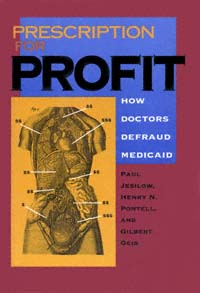 | Title: Prescription for profit: how doctors defraud Medicaid Author: Jesilow, Paul 1950- Published: University of California Press, 1993 Subjects: Science | Sociology | Medicine | Social Problems | Economics and Business Publisher's Description: In this explosive exposé of our health care system, Paul Jesilow, Henry N. Pontell, and Gilbert Geis uncover the dark side of physician practice. Using interviews with doctors and federal, state, and private officials and extensive investigation of case files, they tell the stories of doctors who profit from abortions on women who aren't pregnant, of needless surgery, overcharging for services, and excessive testing.How can doctors, recipients of a sacred trust and sworn to the Hippocratic Oath, violate Medicaid so egregiously? The authors trace patterns of abuse to the program's inauguration in the mid 1960s, when government authorities, not individual patients, were entrusted with responsibility for payments. Determining fees and regulating treatment also became the job of government agencies, thus limiting the doctors' traditional role. Physicians continue to disagree with Medicare and Medicaid policies that infringe on their autonomy and judgment.The medical profession has not accepted the gravity or extent of some members' illegal behavior, and individual doctors continue to blame violations on subordinates and patients. In the meantime, program guidelines have grown more confusing, hamstringing efforts to detect, apprehend, and prosecute Medicaid defrauders. Failure to institute a coherent policy for fraud control in the medical benefit program has allowed self-serving and greedy practitioners to violate the law with impunity. Prescription for Profit is a shocking revelation of abuse within a once-hallowed profession. It is a book that every doctor, and every patient, needs to read this year. [brief] Similar Items |
| 59. | 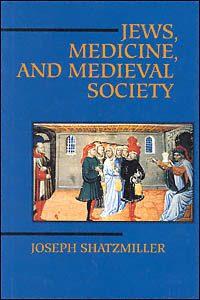 | Title: Jews, medicine, and medieval society Joseph Shatzmiller Author: Shatzmiller, Joseph Published: University of California Press, 1995 Subjects: Jewish Studies | Medieval History | European History | Medieval Studies | Medicine Publisher's Description: Jews were excluded from most professions in medieval, predominantly Christian Europe. Bigotry was widespread, yet Jews were accepted as doctors and surgeons, administering not only to other Jews but to Christians as well. Why did medieval Christians suspend their fear and suspicion of the Jews, allowing them to inspect their bodies, and even, at times, to determine their survival? What was the nature of the doctor-patient relationship? Did the law protect Jewish doctors in disputes over care and treatment?Joseph Shatzmiller explores these and other intriguing questions in the first full social history of the medieval Jewish doctor. Based on extensive archival research in Provence, Spain, and Italy, and a deep reading of the widely scattered literature, Shatzmiller examines the social and economic forces that allowed Jewish medical professionals to survive and thrive in thirteenth- and fourteenth-century Europe. His insights will prove fascinating to scholars and students of Judaica, medieval history, and the history of medicine. [brief] Similar Items |
| 60. | 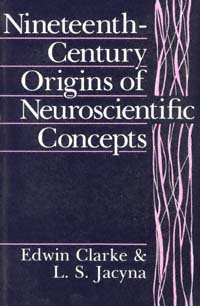 | Title: Nineteenth-century origins of neuroscientific concepts Author: Clarke, Edwin Published: University of California Press, 1992 Subjects: Science | History and Philosophy of Science | Medicine | Ethics Publisher's Description: This book traces the seminal ideas that emerged in the first half of the nineteenth century, when the fundamental concepts of modern neurophysiology and anatomy were formulated in a period of unprecedented scientific discovery. Similar Items |